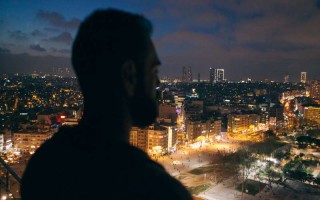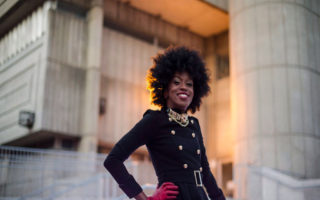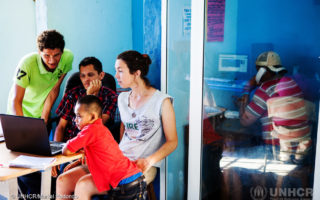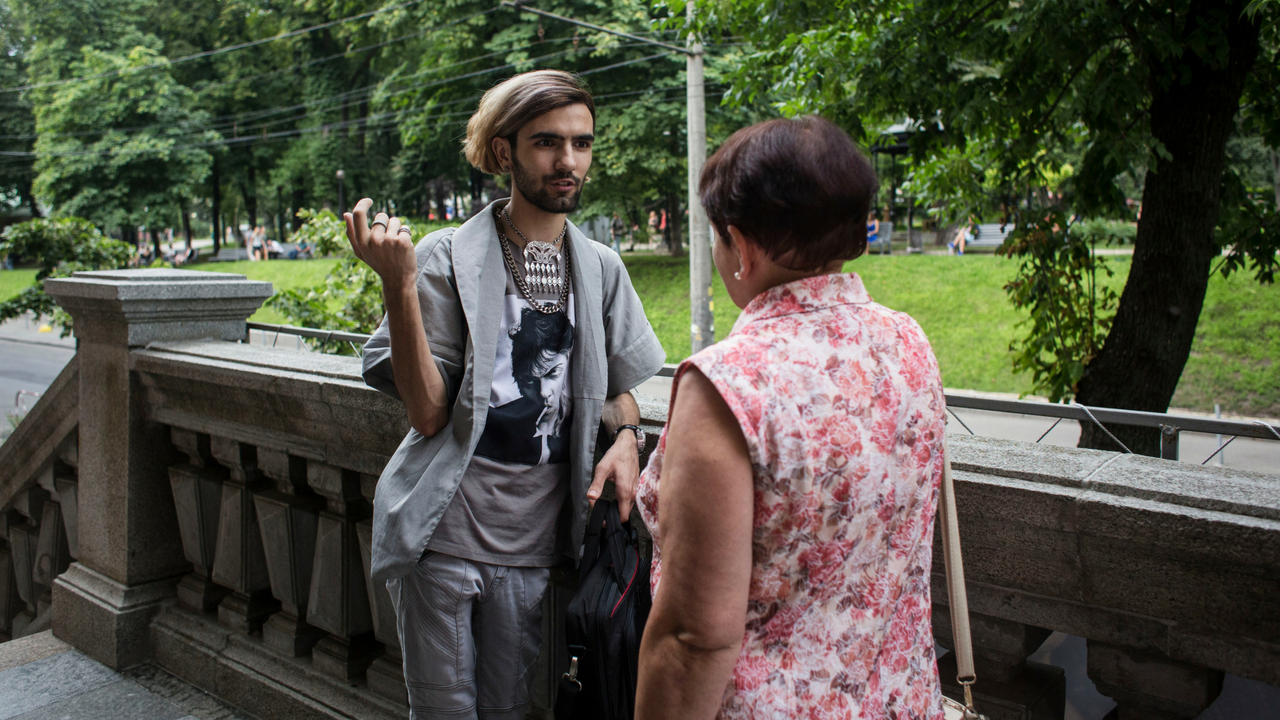
Oleg, an internally displaced gay 22-year-old drama student from Donetsk, talks to a curator at the Museum of Western and Oriental in Kyiv. After growing up victimised by harassment and bullying, he fled to Kyiv in the summer of 2014 as fighting got closer to his home. © UNHCR/Anastasia Vladsova
Fighting is not the only thing driving people from their homes in eastern Ukraine. Persecution is also forcing LGBTI people to flee.
When Viktor,* a 27-year-old gay man, opened his door to police one morning, he knew his secret was out.
His claims of having a girlfriend met with scorn – one of his neighbours had told them everything. Unless Viktor could present the woman within 24 hours or pay a bribe he could not afford, he would be arrested. Panicked, he packed a bag. By the evening, he was gone.
Tragically, Viktor’s story is a familiar one for many gay, bisexual, transgender and intersex (LGBTI) people living in Ukraine, where homosexuality was only legalized in 1991 and is still considered taboo.
“You need to lead a hidden life.”
Discrimination is further exacerbated in eastern regions such as Donetsk, where a devastating conflict has uprooted two million people and cost more than 10,000 lives.
Many LGBTI people face stigma, harassment and violent attacks. In some cases, home has become such a terrifying place that the only option is to leave.
Along with other internally displaced LGBTI people from non-government controlled territories in Ukraine, Viktor found help from an organization called Insight, which runs a shelter and offers legal aid for those without the means to support themselves.
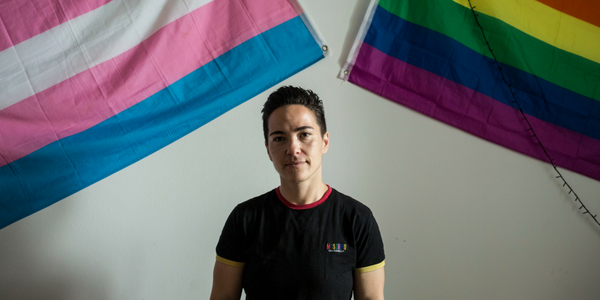
Olena Shevchenko, a human rights activist, sits at her desk at Insight’s office in Kyiv. © UNHCR/Anastasia Vlasova
“It is not easy to be LGBTI in the East,” says its director, Olena Shevchenko. “They can beat you, they can rape you. It’s not possible to be open, because you’re never sure what will happen next. You need to lead a hidden life.”
Even in Kyiv, the nation’s capital which this year hosted its fourth gay pride parade, homophobic discrimination abuse is not unusual. Graffiti recently emblazoned on the wall of a Lush store, which participates in the LGBTI-friendly Kyiv City Map, read: “Ukraine is against perversions. Get out of here!”
Viktor spent four months at the Insight shelter in Kyiv, trying to find a job and a place to live. For internally displaced people (IDPs), who face negative stereotypes in Ukraine, this can be difficult. But for gay or transgender people the stigma doubles.
On top of this, there is the constant worry about the conflict back home and loved ones left behind.
“Many people who come to the shelter still have parents back in Donetsk and Luhansk,” says Shevchenko. “There’s always some military operation so you never know if your house will be next. You don’t have any income, because you can’t find a job, and if somebody hurts you where do you go? It’s an awful life.”
“They tormented me for hours.”
For Oleg, a 22-year-old drama student from Donetsk, it was his own mother who reported him to police and forced him to see a psychologist.
“When my mum first found out I was gay, she didn’t understand,” he says. “It was very shocking for her. She called the police three times to scare me – the first two times they came to our home and just spoke with me, but the third time they took me to the station. They tormented me for hours and told me I was a faggot. I was terrified. When I got home, I remember I said: ‘You are not my mum, because mums don’t do this.’ We didn’t speak for a long time.”
At high school, Oleg was beaten and called names.
“I call it fox hunting,” he says. “They ran after me and I hid. Boys used to push me down the stairs. It happened many different times.”
In the summer of 2014, as conflict broke out, he decided he could take no more and moved north to Kyiv. His mother fled a few months later when their street came under attack. Miraculously, their house remains undamaged, but it is worth little in a conflict zone and neither of them expect to return.
“It’s like a big snowball,” says Oleg. “For me, it was not only about the war – it was also about discrimination and LGBTI identity. It came all at once and you just disappear. You’re misunderstood, lost.” He sighs, with a shrug. “We don’t understand how valuable things are until we lose them.”
UNHCR, the UN Refugee Agency, works to offer individual assistance to the most vulnerable LGBTI IDP’s in Ukraine, issuing legal guidance and training for field staff. It also supports a Ukrainian public initiative called ‘T-ema’ which helps displaced transgender people and is run by participants of a recent UNHCR focus group discussion with representatives of the displaced LGBTI community. In July, the agency took part in Kyiv Pride.
“It takes courage, it takes bravery.”
For Oleg, and many others like him, their future in Ukraine is uncertain. “I can’t go home because I will be in a jail or be killed. I don’t see that I can have a normal life in Ukraine, even in Kyiv. It’s a fight every day and I don’t want it. I want to be normal – I want to have a house and a husband and cats.” He shakes his head, sadly. “We haven’t fought for our rights yet. We haven’t this background. It takes courage, it takes bravery.”
Olena from Insight is among those ready to lead the charge.
“People in Ukraine need their rights and they need protection,” she says. “And they are ready to demand it.”
* Name has been changed for protection reasons



